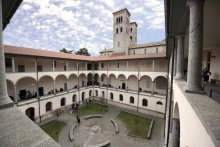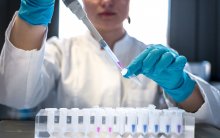Ph.D Course
Restricted access
3 years
Varese
English
DIPARTIMENTO DI BIOTECNOLOGIE E SCIENZE DELLA VITA
Course description
The PhD Program in Life Sciences and Biotechnology (DSVB) promotes strongly interdisciplinary training and research paths. It allows to develop multidisciplinary research topics within national and international networks of excellence, in particular in the following areas:
- Health (from the molecular mechanisms of pathologies to medical technologies for the identification of new therapeutic strategies);
- Environment (with particular regard to sustainability and the challenges of the circular bioeconomy);
- Sustainable plant production.
The general aim of the PhD Program is to provide advanced knowledge and tools, which allow the PhD to design, implement and manage competitive research projects. Through an interdisciplinary approach, the DSVB promotes the acquisition of knowledge deriving from basic biological disciplines (molecular, cellular and at the organism level) and applications in the industrial and biomedical field, as well as in sustainable production and ecosystem conservation.
The PhD Program is intended to train professional figures with a high scientific profile who can integrate into academic experimental science and research, but also within production companies, thanks to interaction with the entrepreneurial fabric of the territory.
Once the Program has been completed, the PhD students will have acquired experience in advanced research methods, analytical skills and abilities in the critical processing of experimental data, as well as specific skills in the field of study of their interest, which they will then be able to apply, in a multidisciplinary context, to complex problem solving.
What you need to know
The PhD in Life Sciences and Biotechnology is established for the XLI cycle.
A total of 9 positions are available, of which:
- 7 positions with scholarship
- 2 positions without scholarship
Apply to the selection call.
Enrollment
The admission qualification should have been obtained in the following fields/areas: Biotechnology, Medicine and Surgery, Dentistry, Veterinary Medicine, Communication Sciences and Techniques, Life sciences, Pharmacy, Psychology, Chemistry and pharmaceutical technologies, Physical sciences, Environmental sciences, Engineering, Agricultural science and technology, Food preparation sciences, Sciences and animal husbandry technologies, Natural sciences, Sciences of technical health professions.
The selection is based on the evaluation of qualifications and an oral examination:
Qualifications Score: Maximum 60 points
Criteria: Candidates' qualifications will be assessed based on their relevance to the themes of the PhD program, as detailed in the Call for Applications. Only candidates who score at least 36 points in the qualification evaluation will be admitted to the oral examination.
Oral Examination Score: Maximum 60 points
The oral examination must be partially conducted in English. Candidates residing abroad or those admitted from outside the institution will be given the opportunity to take the exam online, using only the Microsoft Teams platform. A request must be submitted to the PhD Support Secretariat when the application for the Call is closed. The oral exam is considered passed with a score of at least 40 points.
For further details, please refer to the official Call for Applications.
The training path offered by the DSVB enables PhD candidates to develop theoretical, experimental, and managerial skills in the development of scientific and applied research projects. It thus prepares professionals for employment in organizations operating in the fields of life sciences, applied biology, bioeconomy, and biotechnology. In particular, the skills acquired facilitate employment in the following sectors: Industrial, Pharmaceutical, Nutraceutical, Plant, and Biomedical Biotechnology; Circular Bioeconomy; Sustainable Production and Ecosystem Conservation; Medical and Ambulatory Analysis; Patents and Commercial Sector; Scientific Instrumentation; and Quality Control.
PhD graduates will find opportunities in academic research, as well as in public and private research institutes; in diagnostic laboratories and the development and production of molecular and/or cellular assays; in the production and quality control sectors of biotechnology companies and those involved in biotechnology innovation; in pharmaceutical, agro-food, and chemical industries; and in companies providing services related to biological analysis and control laboratories.
Professional Roles:
- Researchers in public and private sectors, with roles in research/management of bioindustrial production and transformation, diagnostic biotechnology industry, chemical, environmental, agro-food, livestock, and pharmaceutical industries.
- Experts in intellectual/industrial property and licensing agreements for biotechnology technologies.
- Professionals in private practice or entrepreneurs in biotechnology companies who plan, manage, and/or control biotechnological processes for the production of bio-based products.
- Experts in Science Communication, especially in commercial settings.
- Faculty members in educational institutions and higher education organizations.
ISTAT Codes: Biologists and related professions (2.3.1.1.1); Biochemists (2.3.1.1.2); Biophysicists (2.3.1.1.3); Biotechnologists (2.3.1.1.4); Botanists (2.3.1.1.5); Zoologists (2.3.1.1.6); Microbiologists (2.3.1.2.2); Researchers and technicians with degrees in biological sciences (2.6.2.2.1); Researchers and technicians with degrees in medical sciences (2.6.2.2.3); Specialists in medical therapies (2.4.1.2.0); University professors in medical sciences (2.6.1.2.3); Zootechnicians (3.2.2.2.0).
Class attendance
PhD Program Structure in Life Sciences and Biotechnology
Given the interdisciplinary nature of the topics addressed, the program offers a path aimed at developing specific scientific profiles through a diverse and multidisciplinary set of common training activities, which are further differentiated through the development of individual research projects.
The educational activities are organized into five main categories:
- Characterising Activities;
- Transversal Skills;
- Seminars;
- Advanced English Language Training;
- Research Progress Reports;.
The training program is approved annually by the PhD Academic Board, and the calendar of activities is periodically updated.
Educational activities are primarily delivered in person. A blended learning format may be granted upon a well-justified request. The program may also include practical components, either experimental or computational in nature.
Mandatory Courses Offered by the PhD Program.
Year 1
Biostatistics (3 ECTS) – Prof. Giorgio Binelli
This course introduces fundamental statistical concepts for Life Sciences, with a focus on experimental design and data analysis. It aims to help students understand the strengths and limitations of statistical methods in research.
Trends in Biomolecular Science (2 ECTS) – Faculty Members of the PhD Program
This course provides advanced theoretical and practical training in biomolecular sciences. It delivers interdisciplinary knowledge and skills to support students in their biotechnology research across a variety of application areas.
Cross-Disciplinary and Soft Skills – Module A (1 ECTS) – Faculty Members of the PhD Program and External Experts
While technical expertise is essential, cross-disciplinary and soft skills—such as communication, creativity, and management—are equally critical for professional success. These highly sought-after abilities help students apply their scientific knowledge in organizational and professional contexts.
Module A topics: Information literacy; Digital literacy; Doctoral thesis and copyright; Open access; Collecting and processing information.
Year 2
Bioinformatics (3 ECTS) – Prof. Gianluca Molla (offered every two years)
Students gain hands-on experience with key bioinformatics methods for protein analysis. Classes take place in computer labs, where students carry out practical activities under instructor supervision. Results are critically discussed during the course.
Trends in Biomolecular Science (2 ECTS) – Faculty Members of the PhD Program
This course offers continued advanced training in biomolecular sciences, integrating multiple disciplines to equip students with the necessary competencies for biotechnology research in diverse fields of application.
Cross-Disciplinary and Soft Skills – Module B (1 ECTS) – Faculty Members of the PhD Program and External Experts
While technical expertise is essential, cross-disciplinary and soft skills—such as communication, creativity, and management—are equally critical for professional success. These highly sought-after abilities help students apply their scientific knowledge in organizational and professional contexts.
Module B topics: Presentation skills; Problem solving; Research results communication.
Year 3
Cross-Disciplinary and Soft Skills – Module C (1 ECTS) – Faculty Members of the PhD Program and External Experts
While technical expertise is essential, cross-disciplinary and soft skills—such as communication, creativity, and management—are equally critical for professional success. These highly sought-after abilities help students apply their scientific knowledge in organizational and professional contexts.
Module C topics: Economics; Project management; Patents & trademarks; European research funding programs.
Mandatory and Optional Activities to be Completed During the Three-Year Program
- Innovation Camp for Insubria PhD Students – A Deep Dive into Innovation and Execution (2.5 ECTS)
Instructors: Prof. Mauro Fasano, Prof. Alessia Pisoni, Prof. Andrea Vezzulli - Safety in the Laboratory (1.75 ECTS)
Instructors: Prof. Carlo Lucarelli, Prof. Stefano Fanetti, TBD - Artificial Intelligence (1 ECTS)
Instructor: Prof. Mauro Fasano - Research Integrity (1.5 ECTS)
Instructor: Prof. Marco Cosentino - Academic Writing and Publishing (1 ECTS)
Instructor: Prof. Andrea Vezzulli - Personal Branding (1.5 ECTS)
Instructor: TLC - Public Speaking (1 ECTS)
Instructor: TLC - Project Management (1 ECTS)
Instructor: TLC - Introduction to Systems Biology (1.5 ECTS) – Organized by the PhD Program in Experimental and Translational Medicine
Instructor: Prof. Mauro Fasano
Seminars, courses, workshops, and other educational activities organized by the Doctoral School, University PhD Programs, or other universities (provided attendance is certified and credits are awarded), may be freely chosen by the PhD student for a total of 0.5 ECTS per academic year.
These activities are included in the DSVB training program to allow doctoral candidates to build a personalized advanced training path that reflects their scientific interests. Students may select and schedule attendance at seminars throughout the three years of the PhD program, acquiring targeted theoretical and practical knowledge. This knowledge can then be applied to their specific research areas, enabling them to adopt alternative and/or innovative solutions to the challenges related to their projects.
The University offers optional English language courses through a multimedia software platform (MacMillan English Campus – MEC) as well as a preparatory English course aimed at obtaining the B2 level certification.
At the end of the PhD program, a B2 level English language certification is required and mandatory for the award of the doctoral degree.
Do you already hold an English language certification? Please check whether it is recognized as valid for the PhD Program in Life Sciences and Biotechnology.
At the end of each academic year, the PhD candidate prepares and presents a presentation related to their research project. Additionally, the candidate must submit a two-page report summarizing the progress of their research project.
Studying
Experimental activity and active involvement in research projects play a central role in the training of PhD candidates. The main research areas include:
- The study of the structure, function, and regulation of genes and proteins to understand biological processes.
- Microbiological applications in the pharmaceutical and industrial sectors.
- The development of innovative biotechnological processes through the use of enzymes, microorganisms, and invertebrates.
- The characterization of the response of animal and plant organisms to environmental factors, with the aim of improving their productivity and resistance to stress.
- Medical biotechnology, ranging from regenerative medicine to various applications in clinical research.
Available Projects:
- Prof. Antonino Bruno
“Phenotypic/Functional Plasticity of Innate Immune Cells (Neutrophils, Eosinophils, Natural Killer) in Atherosclerosis: Pathogenetic Effects, Identification of Circulating Biomarkers, and Potential Therapeutic and/or Preventive Targets”. - Prof. Laura De Girolamo
“Development and validation of a personalized predictive model for regenerative medicine in the treatment of knee osteoarthritis: integrating clinical, radiological, and molecular data to support therapeutic decision-making.” - Prof. Marzia Gariboldi
“Targeting tumor hypoxia and stimulating immunogenic cell death through engineered oxygen-delivering nanoparticles in photodynamic cancer therapy”. - Prof. Annalisa Grimaldi
“The Medicinal Leech Hirudo verbana as an in Vivo Model for Studying the Effectiveness of 3D Patches in Wound Healing and Tissue Regeneration”. - Prof. Evgenia Karousou
“The role of exosomes in hyaluronan metabolism in the breast tumor microenvironment”. - Prof. Loredano Pollegioni
“Sustainable approaches for the synthesis of components in cultivated meat production”. - Prof. Silvia Sacchi
“Role and modulation of the serinosome in serine biosynthesis.” - Prof. Gianluca Tettamanti
“Effects of heavy metal exposure on Hermetia illucens larvae.” - Prof. Candida Vannini
“Investigating the Roles of Plant Peptides in Environmental Adaptation”.
Attaining your qualification
At the end of the third year, the PhD Teaching Board evaluates the candidate’s academic progress for admission to the evaluation procedures based on the following criteria:
- Publication, acceptance, or submission (certified) of an ISI/Scopus article and/or patent relevant to the research work, along with one abstract presented at a conference (aligned with the nature of the PhD project).
- Final written report of the research activities carried out during the three-year period.
- Fulfillment of attendance requirements for mandatory and optional teaching activities, as well as transversal skills courses.
- A summary assessment of the candidate's performance and research activities, including tutoring, provided by the Supervisor and/or Tutor in the Progress Evaluation Form (second semester of the third year), with the recommendation for admission to the Final Examination.
The procedures regarding the format, preparation (which must be in English), presentation, and evaluation of the thesis are outlined in the Guidelines for the Preparation of the PhD Thesis.
Student services
Course committees and representatives
Composition of the PhD Board in Life Sciences and Biotechnology:
- Battaglia Paolo
- Berini Francesca
- Binelli Giorgio Pietro Mario
- Bracale Marcella
- Bruno Antonino
- Campomenosi Paola
- Caruso Enrico
- Cerabolini Bruno
- Donati Simone
- Gariboldi Marzia Bruna
- Gornati Rosalba
- Grimaldi Annalisa
- Karousou Evgenia
- Marinelli Flavia
- Molla Gianluca
- Montagnoli Antonio
- Orlandi Viviana
- Piubelli Luciano
- Pollegioni Loredano
- Raspanti Mario
- Rosini Elena
- Sacchi Silvia
- Terova Genciana
- Tettamanti Gianluca
- Tettamanti Lucia
- Tozzi Matteo
- Turri Zanoni Mario
- Valli Roberto
- Vannini Candida
- Vigetti Davide
- Viola Manuela
The AiQua PhD SVB Committee is responsible for overseeing the quality control of all teaching and research activities within the PhD program. It interacts with the PhD Teaching Board, the PhD School, and the Department Council.
The Committee is composed of the Coordinator, two members of the Teaching Board, one PhD student representative, and one member of the Educational Secretariat. The composition of the Committee is proposed by the Teaching Board and appointed by the Department Council.
The Advisory Committee is composed of the Coordinator and at least five members with a renewable three-year term. These members are selected from among the stakeholders (PI) and are appointed by the PhD Board upon the Coordinator's recommendation. The composition of the Advisory Committee may be modified or updated to ensure it reflects the representation of the stakeholders.





